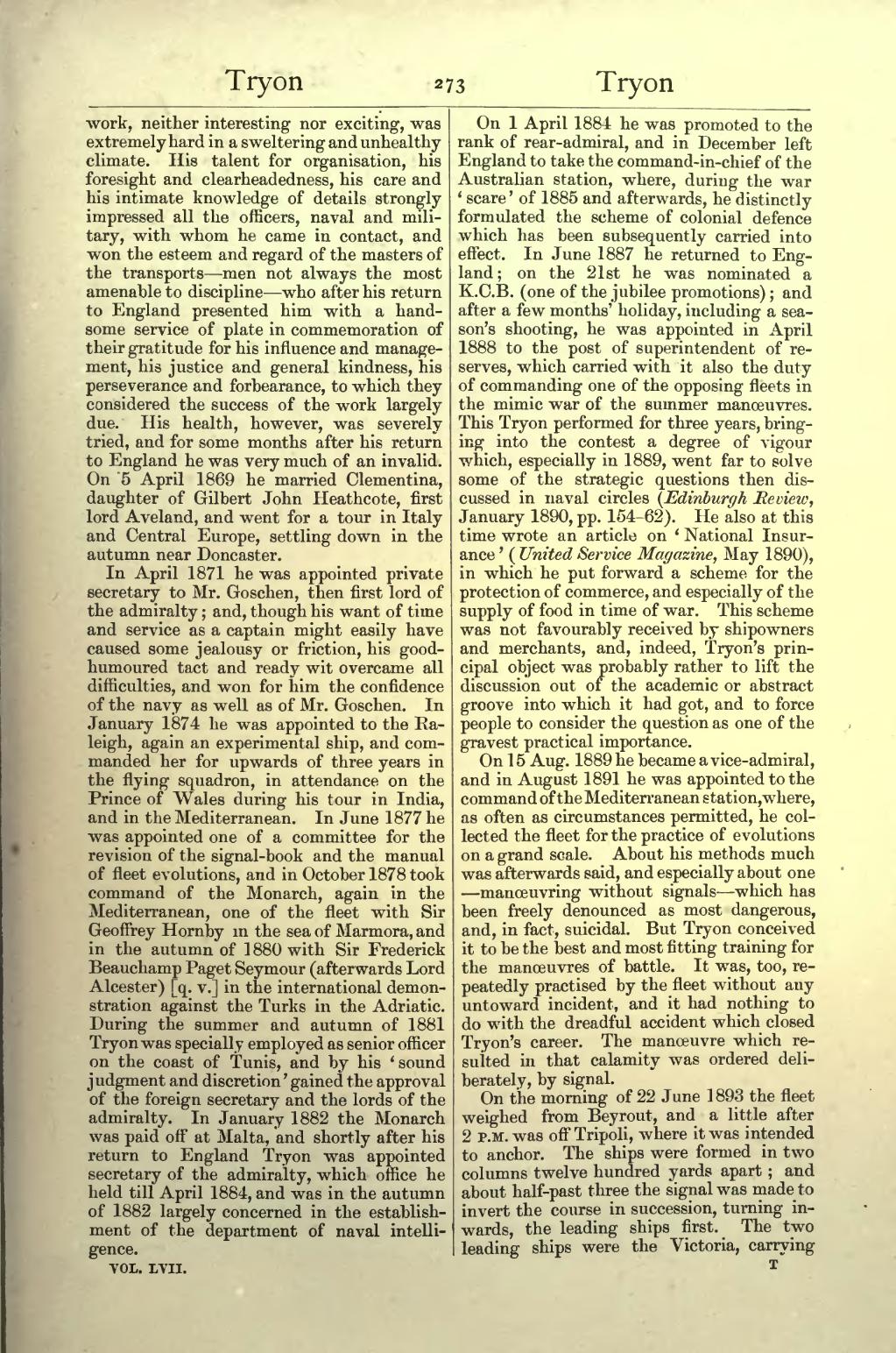work, neither interesting nor exciting, was extremely hard in a sweltering and unhealthy climate. His talent for organisation, his foresight and clearheadedness, his care and his intimate knowledge of details strongly impressed all the officers, naval and military, with whom he came in contact, and won the esteem and regard of the masters of the transports—men not always the most amenable to discipline—who after his return to England presented him with a handsome service of plate in commemoration of their gratitude for his influence and management, his justice and general kindness, his perseverance and forbearance, to which they considered the success of the work largely due. His health, however, was severely tried, and for some months after his return to England he was very much of an invalid. On 5 April 1869 he married Clementina, daughter of Gilbert John Heathcote, first lord Aveland, and went for a tour in Italy and Central Europe, settling down in the autumn near Doncaster.
In April 1871 he was appointed private secretary to Mr. Goschen, then first lord of the admiralty; and, though his want of time and service as a captain might easily have caused some jealousy or friction, his good-humoured tact and ready wit overcame all difficulties, and won for him the confidence of the navy as well as of Mr. Goschen. In January 1874 he was appointed to the Raleigh, again an experimental ship, and commanded her for upwards of three years in the flying squadron, in attendance on the Prince of Wales during his tour in India, and in the Mediterranean. In June 1877 he was appointed one of a committee for the revision of the signal-book and the manual of fleet evolutions, and in October 1878 took command of the Monarch, again in the Mediterranean, one of the fleet with Sir Geoffrey Hornby in the sea of Marmora, and in the autumn of 1880 with Sir Frederick Beauchamp Paget Seymour (afterwards Lord Alcester) [q. v.] in the international demonstration against the Turks in the Adriatic. During the summer and autumn of 1881 Tryon was specially employed as senior officer on the coast of Tunis, and by his ‘sound judgment and discretion’ gained the approval of the foreign secretary and the lords of the admiralty. In January 1882 the Monarch was paid off at Malta, and shortly after his return to England Tryon was appointed secretary of the admiralty, which office he held till April 1884, and was in the autumn of 1882 largely concerned in the establishment of the department of naval intelligence.
On 1 April 1884 he was promoted to the rank of rear-admiral, and in December left England to take the command-in-chief of the Australian station, where, during the war ‘scare’ of 1885 and afterwards, he distinctly formulated the scheme of colonial defence which has been subsequently carried into effect. In June 1887 he returned to England; on the 21st he was nominated a K.C.B. (one of the jubilee promotions); and after a few months' holiday, including a season's shooting, he was appointed in April 1888 to the post of superintendent of reserves, which carried with it also the duty of commanding one of the opposing fleets in the mimic war of the summer manœuvres. This Tryon performed for three years, bringing into the contest a degree of vigour which, especially in 1889, went far to solve some of the strategic questions then discussed in naval circles (Edinburgh Review, January 1890, pp. 154–62). He also at this time wrote an article on ‘National Insurance’ (United Service Magazine, May 1890), in which he put forward a scheme for the protection of commerce, and especially of the supply of food in time of war. This scheme was not favourably received by shipowners and merchants, and, indeed, Tryon's principal object was probably rather to lift the discussion out of the academic or abstract groove into which it had got, and to force people to consider the question as one of the gravest practical importance.
On 15 Aug. 1889 he became a vice-admiral, and in August 1891 he was appointed to the command of the Mediterranean station, where, as often as circumstances permitted, he collected the fleet for the practice of evolutions on a grand scale. About his methods much was afterwards said, and especially about one—manœuvring without signals—which has been freely denounced as most dangerous, and, in fact, suicidal. But Tryon conceived it to be the best and most fitting training for the manœuvres of battle. It was, too, repeatedly practised by the fleet without any untoward incident, and it had nothing to do with the dreadful accident which closed Tryon's career. The manœuvre which resulted in that calamity was ordered deliberately, by signal.
On the morning of 22 June 1893 the fleet weighed from Beyrout, and a little after 2 p.m. was off Tripoli, where it was intended to anchor. The ships were formed in two columns twelve hundred yards apart; and about half-past three the signal was made to invert the course in succession, turning inwards, the leading ships first. The two leading ships were the Victoria, carrying
